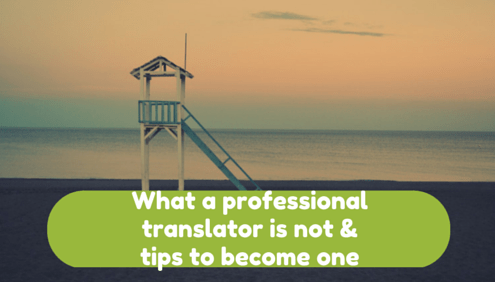How (Not) to Be a Professional Translator and 6 Tips to Help You Become One
By Alina Cincan
Reblogged from Inbox Translation blog with permission from the author
 A professional translator’s job is not as easy as it looks. A bilingual dictionary, the internet and a working knowledge of the source and target languages are not sufficient to become a self-styled professional. Depending on the speciality area, an aspiring translator needs several hundred hours of practice, subsequent certification (in some cases) and then a quite a bit of experience before they feel ready to tackle certain topics.
A professional translator’s job is not as easy as it looks. A bilingual dictionary, the internet and a working knowledge of the source and target languages are not sufficient to become a self-styled professional. Depending on the speciality area, an aspiring translator needs several hundred hours of practice, subsequent certification (in some cases) and then a quite a bit of experience before they feel ready to tackle certain topics.
What a professional translator is not
A translation professional is NOT:
- A person who speaks two languages, even at native level
This is certainly a prerequisite; however, this alone is not enough.
- A student of languages
They may be on their way of becoming a translator (though they may choose a different path), but they cannot be called professional translators. Not at this stage anyway.
- A teacher of languages
Teaching and translating require different sets of skills. Sure, a translator can also assume the role of teacher (I have done that), but that does not mean that any teacher of languages can translate. The opposite is also true: not any translator can be a teacher.
- A dictionary
Some people assume that a translator knows all the words in their language pair and two of the questions we get asked frequently is: ‘What does … mean’ or ‘How do you say…..?‘, to which we invariably answer ‘It depends on the context‘)

Image from the talented Alejandro Moreno (Mox) on his blog: http://mox.ingenierotraductor.com/2010/03/most-used-sentences-by-translators.html
The wrong approach
In order to be a professional translator, one must be ready to pay the price in terms of hard work, insurmountable challenges and rare opportunities for big success. If a person is merely doing translations on a casual basis, the work must also be casual – meaning, it must not be able to adversely impact the reader of the target text. Working out the instructions on a lawn mower might not need a professional translator, but anything more important than that will warrant hiring a professional. In fact, if you don’t want the service warranty on your mower to be voided, don’t even do that!
The proper approach to translation as a career
The right way to go about becoming a professional translator is… well, there isn’t necessarily a right way per se. One can take the translation studies route (Joseph Lambert and Caroline Alberoni both touched on this aspect on their blogs: The (un?)importance of translation-specific degrees to translation and Does an academic background really make a difference?) or have a totally different profession and later turn to translations, as Sarai Pahla has done and written about. Some countries require specific certifications for those who want to call themselves translators and work in this field. The UK does not. However, that doesn’t mean anyone can be a translator (regardless of what they claim).
A professional is someone who does something for a living, who is committed to continual professional development, who has the right skills (just knowing another language is not enough – I may be repeating myself, but it is the truth), who strives to find the right words, who understands the two cultures, who has excellent writing skills and the list can go on; so, until you make a career of it and are able to generate a monthly income from it, you are still an aspiring professional.
Finding the right kind of translation job
Before you embark on your long journey down The Language Highway, you need to do some forward-thinking with respect to what kind of translation you’d be happy doing for the rest of your life. If you are a primarily left-brained individual, then a career in technical translation might be suitable; alternatively, if you seek a career in the legal or medical fields, that kind of translation work is what you should be targeting.
If you want to specialise in marketing translations or if financial translations are your cup of tea, you need to make sure you understand the terminology (I am referring especially to translators without a medical or legal background). Mistakes can be costly, and especially in these two fields a correct translation can make the difference between life and death. Nowadays there are plenty of CPD courses you can embark on – some even free, and the community of translators is a friendly one, so there will always be someone to help you.
What you should never do: accept a translation job that is beyond your abilities. Not only will it take you longer to carry out, but doing a so-so job instead of a great one will have an impact on your reputation and subsequent assignments. Not to mention potential damage you might (involuntarily) be responsible for.
Building a career
Being a professional is much more than just having a full-time translation job. Career progress is an important aspect of being a professional – one of the most important, in truth. Your work ethic is critical to this: unless you can behave like a professional, you will not be treated like one.
- Make sure that any work that leaves your table is error free
- Only accept projects you are qualified to take on
- Get projects done in a timely manner
- Use project management tools to help you schedule your work in a more efficient way
- Never stop learning and perfecting your skills
- Above all, maintain the cool, calm collectedness of a true professional
This is the only way to becoming a highly regarded professional translator, whether in-house or freelance.
If you think I’ve missed any points, feel free to add them in a comment below.
Header image credit: Unsplash
Header image edited with Canva

I love the list of what a translator is not, specifically the “A person who speaks two languages”. I’d like to find some substantiating data backing the statement so that I can share the knowledge to potential customers who say “I have someone who speaks Spanish in my office” or “a family member can translate that if I need it”. Do you know where I could find that data? Sometimes having proof is more convincing than just saying its so. Great article.
[…] que fazer e não fazer para ser um tradutor profissional, segundo o blog Savvy Newcomer da […]
[…] your first corpus and analyze it with AntConc (and related links to explore!) How (Not) to Be a Professional Translator and 6 Tips to Help You Become One Style Guides: Your Road Map to Translation & Localization Success (part 2) Localization for […]